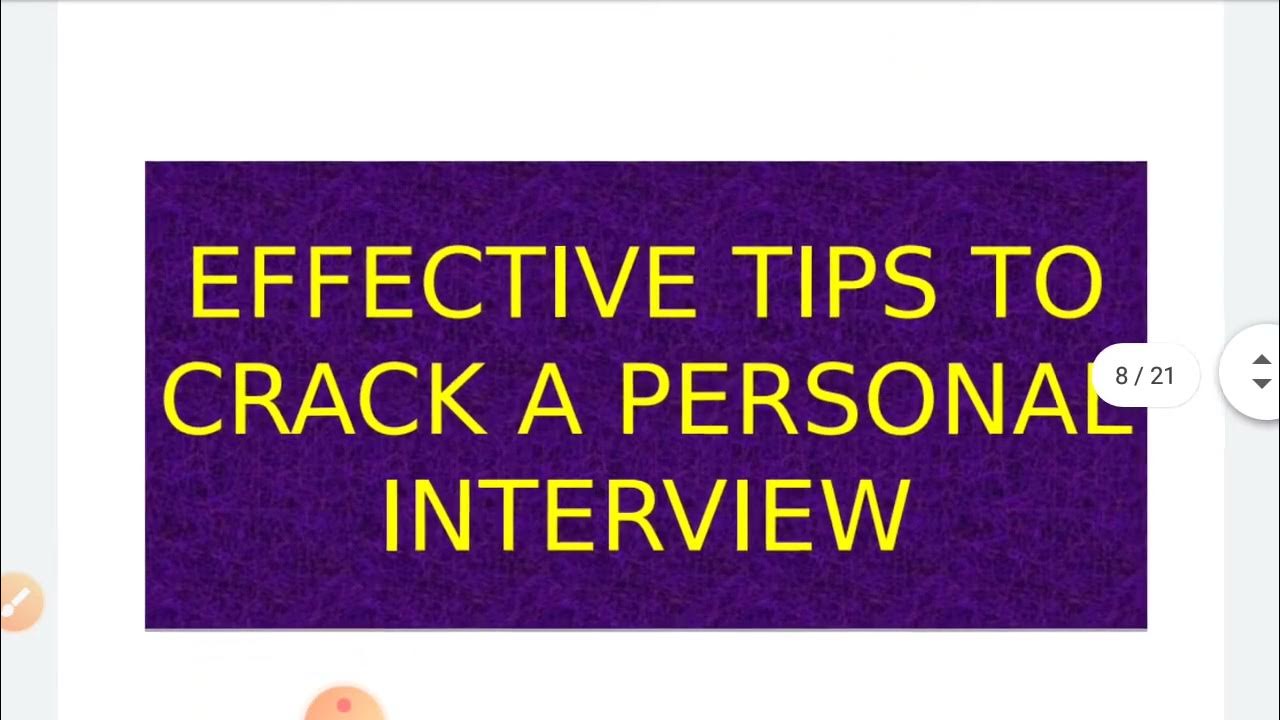Personal Interview II Nabamita Das
Summary
TLDRThis video provides an insightful guide on personal interviews (PI), aimed at final-year students preparing for job interviews. It explains what a PI is, the reasons for conducting one, and the different types of interviews, including one-on-one, group, stress, and technical interviews. The video also outlines key tips for acing a PI, such as punctuality, body language, mock interviews, and researching the company. Finally, it covers common interview questions and emphasizes the importance of maintaining a positive attitude throughout the interview process.
Takeaways
- 📋 A personal interview (PI) is a meeting between a potential employer and a job seeker, intended to assess if the candidate fits the job profile and company culture.
- 🔍 PIs are conducted to allow employers to evaluate candidates beyond their resumes, in a more personal and direct interaction.
- 👥 Types of personal interviews include one-on-one interviews, group interviews, stress interviews, HR/behavioral interviews, technical/functional interviews, and remote interviews via phone or video call.
- 📝 Interview questions typically fall into three categories: technical questions, analytical questions, and behavioral questions.
- ⏰ It's essential to arrive 15-20 minutes early to an interview, giving time to relax and review the job description and resume.
- 📑 Candidates should bring necessary documents like certificates, mark sheets, and resumes, while thoroughly understanding how their skills align with the job description.
- 🗣️ Honest and concise answers are crucial in a PI. If uncertain about an answer, it's better to admit not knowing than to fake it.
- 👂 Listening carefully to the interviewer and responding confidently shows respect and good communication skills.
- 💡 Preparing through mock interviews, debates, and reading helps develop communication and reduce nervousness during the actual interview.
- 📈 Body language, including posture, eye contact, and facial expressions, plays a vital role in creating a positive impression during the interview.
Q & A
What is the purpose of a personal interview (PI)?
-A personal interview is conducted to assess whether a candidate fits the job profile and the work culture of an organization. It helps the employer understand the candidate beyond their resume through face-to-face interaction.
What are the different types of personal interviews mentioned in the script?
-The script mentions several types of personal interviews: one-to-one interviews, group interviews, stress interviews, HR/behavioral interviews, technical/functional interviews, and telephonic or Skype interviews.
Why do employers conduct personal interviews instead of just reviewing resumes?
-Employers conduct personal interviews to get to know the candidate as a person, beyond their resume, and to evaluate their personality, technical knowledge, and whether they are the right fit for the company.
What are the key types of questions asked in a personal interview?
-The key types of questions asked in a personal interview are technical questions, analytical questions, and behavioral questions. These questions assess the candidate's job-specific knowledge, reasoning skills, and personality traits.
What is a stress interview, and why is it used?
-A stress interview is designed to expose candidates to critical and stressful situations to determine their ability to handle pressure and provide problem-solving solutions.
What are some effective tips for cracking a personal interview?
-Effective tips include arriving early, carrying necessary documents, answering honestly, practicing mock interviews, listening attentively, maintaining good body language, dressing professionally, researching the company, staying positive, and preparing for frequently asked questions.
Why is body language important in a personal interview?
-Body language is important because it reveals a lot about a candidate’s personality. Sitting straight, staying calm, maintaining eye contact, and using appropriate gestures can create a positive impression on the interviewer.
How can candidates prepare for common interview questions?
-Candidates can prepare for common interview questions by reviewing frequently asked questions such as 'Tell me about yourself,' 'What are your strengths and weaknesses?' and 'Why do you want this job?' Preparing answers in advance helps ensure confident responses.
What role does research about the company play in interview preparation?
-Researching the company helps candidates become familiar with the organization’s history, values, and latest developments, enabling them to confidently answer questions and show their genuine interest in the role.
Why is it important to ask questions during a personal interview?
-Asking smart questions during an interview demonstrates that the candidate is engaged, thoughtful, and interested in the company’s future. It also reflects the candidate's curiosity about the job and their desire to contribute to the organization's success.
Outlines

This section is available to paid users only. Please upgrade to access this part.
Upgrade NowMindmap

This section is available to paid users only. Please upgrade to access this part.
Upgrade NowKeywords

This section is available to paid users only. Please upgrade to access this part.
Upgrade NowHighlights

This section is available to paid users only. Please upgrade to access this part.
Upgrade NowTranscripts

This section is available to paid users only. Please upgrade to access this part.
Upgrade NowBrowse More Related Video

Personal Interview II Tips and Strategies

A BASIC GUIDE TO CANADIAN UNIVERSITY APPLICATIONS ✩ ontario ed. | Allie C.

JOB INTERVIEW (KELAS XII)

JOB INTERVIEW-ENGLISH KELAS XII

Job Roadmap for freshers , beginners #softwaredeveloper #jobpreparation

MEXT Government Scholarship Overview: Embassy Recommendation for Applicants in Malaysia
5.0 / 5 (0 votes)